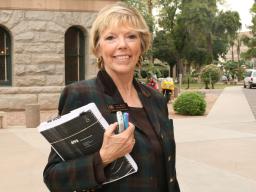- Slug: BC-CNS-Energy-Competition,640
- With: BC-CNS-Energy-Competition-Box
- Photo available (thumbnail, caption below)
By ALEXANDER MacLEAN
Cronkite News Service
PHOENIX (Thursday, Nov. 12) _ Opening Arizona to competition by companies providing electricity could lower rates and give providers more incentive to act wisely when considering investments on infrastructure, experts told a group of state lawmakers Thursday.
“Under the current system, the regulated utilities are playing with the ratepayers’ money, and they have no incentive to save costs,” said Andrew N. Kleit, a professor of energy and environmental economics at Pennsylvania State University. “If we move toward restructuring, they’ll be investing with their own money and they’ll have incentives to reduce their costs leading to reduced costs for Arizona ratepayers.”
Kleit and Stanley S. Reynolds, a University of Arizona economics professor, co-authored a report explaining the advantages of a competitive electricity market for the Goldwater Institute, an advocacy group committed to limited government and free-market values.
On Thursday, they discussed the findings before a group of lawmakers led by Rep. Lucy Mason, R-Prescott. They were joined by Bill Peacock, director of the Texas Public Policy Foundation’s Center for Economic Freedom, who touted what he called the success of his state’s moves to increase competition among electricity providers.
Reynolds said that the benefits of competition include giving competing companies incentives to keep their rates low and increasing innovation.
“Technology in solar power, nuclear and distributed generation is advancing rapidly,” he said. “Competition is a way to harvest that potential.”
Peacock said that more than 5 million Texas residents buy their electricity in deregulated markets around the state. While not all have seen a significant drop in rates, he said, they all have more choices, including the ability to buy solely from providers who harness renewable energy sources such as solar and wind.
“Markets don’t guarantee the lowest possible prices, but they do provide the best possible prices based on a customer’s preference,” he said.
Martin Shultz, a lobbyist for Arizona Public Service Co., raised concerns that a competitive market could see companies focusing mainly on areas that are most profitable.
“Our obligation is to serve every customer anywhere, even in remote areas,” said Shultz. “That’s our cost as a public service company.”
Russell Smolden, a lobbyist for Salt River Project, said that this obligation is important for consumers who are dependent on electricity, especially during the hot months of the year.
“Utilities have an obligation to serve, and that’s important for consumers when it can reach close to 100 degrees at night,” he said.
When California partially deregulated its energy system in 1998, it opened the door to market manipulation from companies like Enron, a move that led to widespread power shortages in many parts of the state, said Tom Jones, CEO of the Grand Canyon State Electric Cooperative Association Inc., a nonprofit organization that represents six electric cooperatives in Arizona.
“In California, they tried to take an industry that is controlled by physics and instead tried to control it by economics,” he said.
Mason said she convened the hearing because she supports deregulation and free enterprise and sees competition among electricity providers as a way to open markets and create jobs. She said she hopes Thursday’s conversation will be the first of many.
“I understand reality and I understand policymaking to the point where we have a tremendous agenda ahead of us to try and get to deregulation or re-regulation,” Mason said. “I have to tell you, this may take years.”
Rep. Tom Chabin, D-Flagstaff, said that he is concerned that moves toward deregulation might hurt initiatives intended to reduce greenhouse gases generated by energy production and increase the availability of renewable energy.
“Often what can be thrown out by the Goldwater Institute when it comes to deregulation can be very short-sighted,” he said. “If it’s purely about competition and whatever is going to be cheap and whatever is going to be expedient in terms of production and distribution, then environmental standards are going to be forgotten.”
^___=
Web Link:
_ Goldwater Institute: www.goldwaterinstitute.org
^___=
PHOTOS: Click thumbnails to see full-resolution images.

State Rep. Lucy Mason, R-Prescott, chaired a hearing Thursday, Nov. 12, 2009, at which advocates and experts argued for allowing companies to compete to offer electricity in Arizona. (Cronkite News Service Photo by Alexander MacLean)